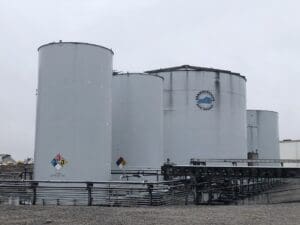When TVA asked residents and businesses to voluntarily conserve energy during a record-breaking cold snap the morning of Jan. 17, the folks at Kentucky’s largest ethanol production facility were prepared to respond.
Commonwealth Agri-Energy in Hopkinsville, Ky., participates in TVA’s Enel X Demand Response Program that allows industrial customers to earn money and drive energy savings by voluntarily reducing energy consumption during times of high electricity demand.
Plant Manager John Stahl says, “We have seen a mutually beneficial relationship in terms of being able to assist the grid when there’s heavy demand, and there’s also a function to it that allows our operators to be more conscientious of our own electrical usage here on site, so from that standpoint we think it helps both parties.” He continues that they value their partnership with the TVA.
Stahl says the company can normally cut back on their energy usage by 10-15 percent with little notice in a high-demand event.
The plant employs 37 workers, grinds 16 million bushels of corn annually and produces about 50 million gallons of ethanol each year.
It’s not just an ethanol plant, though, as described by Stahl, who was there when it opened in 2004.
“We are a corn-to-ethanol facility, we grind No. 2 yellow corn that’s grown in a multi-county region here and distill it into 200 proof fuel grade alcohol,” he explained. “Of course, as Covid came along, we grew a market for high quality alcohol that goes in topical/industrial solutions. We also produce co-products from our process, such as a feedstock that’s primarily for poultry, but also serves some cattle markets. We produce CO2 that goes next door to a facility that uses it for carbonic beverages and dry ice solutions. Additionally, we produce corn oil, which is basically just capturing the fat content out of the leftover syrup product and segregating that out to sell to producers.”
With that type of traffic at the facility on a regular basis, being energy efficient also makes good business sense. Stahl says they monitor efficiencies anyway and this just kind of falls lock and step within the programs we already have in house.
Often the effort to conserve energy is coordinated and intentional, to avoid certain activities during peak power demand hours that make a real difference.
“A lot of it is about timing,” Stahl continued. “Feed sales for instance; We can stagger dry feed production versus wet feed production based on demand and time that out to help meet TVA’s needs. When it’s really hot or really cold weather, there’s heavier demand on the grid, so we take that into account when we do some of our forecasting and planning of feed sales and that helps us to participate.”
When the plant is pumping out products at full rate, Stahl says they reach many points throughout the region in various ways.
“The highest volume product we send out the door is 200 proof fuel, and by federal mandate that gets blended into every gallon of gasoline in the United States. We meet that need here regionally. Most of our product right now goes to the Nashville market and points south, but at different times we’ve served other markets.”
Stahl hopes to see more industries willing to partner with TVA on the rare occasion power demand across the Valley is spiking, as he finds it something that helps all parties.
“TVA has to meet the power demand for residents, businesses and industries regardless of the weather being good or bad,” he said. “And with us having some flexibility within our process to be able to assist them through these curtailment programs, we feel it’s advantageous for both parties at times.”
Commonwealth Agri-Energy also has a good partner in their local power company—Pennyrile Rural Electric Cooperative.
“When extreme weather comes along, they’re kind of the local ‘boots on the ground’ that can give us feedback on what might be coming,” Stahl explained. “They’ve been a wonderful partner for us alongside TVA, and we don’t take it for granted.”
Stahl notes Commonwealth Agri-Energy also joins TVA in working toward a cleaner environment.
“We are off-setting the need for oil-producing entities outside of our region and our country’s borders—we’re trying to meet the need for energy in the form of ethanol to primarily fuel vehicles—that’s what got us started,” he said. “We produce a clean-burning product, so there’s significant value. We’re just a very purpose-driven business here, and we’re grateful for the opportunity we have here to serve the community in the various capacities that we do.”
The facility owned by Hopkinsville Elevator Co. also sees their efforts to conserve energy in high-demand times as being a good neighbor and corporate citizen. In the end, Commonwealth Agri-Energy realizes that a healthy power grid means a healthy power supply for them year-round.
Story by TVA Senior Media Specialist Adam May


